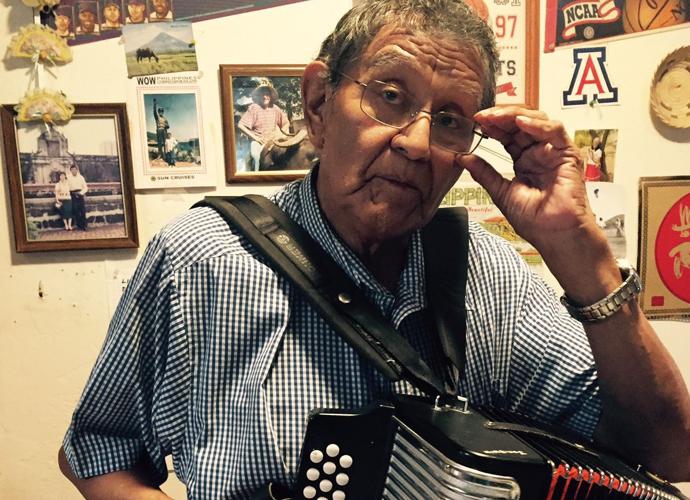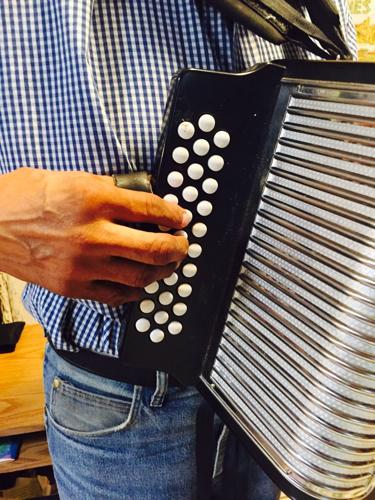A couple of weeks ago, at a party on the edge of Mission San Xavier del Bac, I saw a rock star. The tall man, with a slight, crooked stoop, strapped his button accordion around his chest and his fingers began to punch in the musical rhythm of the desert people.
It was Daniel Joaquin and the music he played is called waila.
Joaquin is not glamorous and never appeared on the cover of Rolling Stone. He is miles outside of the mainstream of pop culture.
But, simply put, Joaquin is an authentic musical astro, a cultural treasure, an ambassador of the Tohono O’odham and their joyful music. Together with his siblings and nephews, Joaquin took the music of the desert people, who live in the sprawling land from Southern Arizona to northern Mexico, and spread it to places and venues reserved only for a select few artists.
The Joaquin Brothers exposed the emblematic and energetic music of the Tohono O’odham to a wide audience. With their saxophones, accordion, bajo sexto, guitar, bass and drums, this legendary waila band showcased the innovative convergence of Tohono O’odham, Mexican and European music.
To some the music is called chicken scratch with its bouncy polkas, schottisches and cumbias. To Joaquin, a self-taught musician who plays at least six instruments, waila is happy music.
“It makes me feel great,” said Joaquin while I visited him and his wife, Pat, at their south-side home Friday.
He’s 73 now and plays infrequently outside of his home. He admits to being a bit rusty and out of rhythm, but he’s still a towering musical figure from our borderlands.
The Joaquin Brothers have performed at Tucson Meet Yourself and other area festivals, including the annual Waila Festival sponsored by the Tucson Historical Society. The group has showcased the instrumental social dance music in various American cities and in Toronto.
But the band’s apex arrived on June 11, 1992, when the Joaquin Brothers performed in New York City’s Carnegie Hall, one of this country’s highest musical temples. It was the first time and probably the last time that Tohono O’odham artists graced that stage.
Joaquin gets teary-eyed still when he recalls the day when the band was performing in Tucson and a man, dressed in a tie, walked up to Joaquin and asked if the Joaquin Brothers would be interested in traveling to New York City.
“I was very happy when I turned around and told the boys,” Joaquin said.
He and his wife last year published a brief, soft-bound book about his life, aptly called, “The Joaquin Brothers: In My Own Words, From Covered Wells to Carnegie Hall.”
Joaquin’s older brother, Angelo Joaquin Sr., started the band in 1957 in Los Angeles. Angelo, who died in 1995, had left Arizona to work in California, as did other O’odham, who back then were known as the Papago, the name given to them when the Spanish colonizers arrived in the 16th century.
At the time the band was formed, Daniel was in a Phoenix-area boarding school for Native Americans. There he learned to play the saxophone for the school’s marching band.
Music was an integral part of life for the Joaquin brothers, who were born in Covered Wells, about 20 miles northwest of Sells, on the Tohono O’odham Reservation. They listened to the musicians play guitars and violins. They watched the people dance and dance and dance. Waila, the word, is derived from the Spanish word baile.
After Joaquin finished school, his brother asked him to join the band, which had returned to Arizona. Joaquin brought his saxophone to the ensemble, replacing the violin. He later learned the accordion. The other band members included a third brother, Fernando, and nephews Ron, Jerome and Leonard Joaquin.
The band performed throughout the Tohono O’odham nation and outside as well. Often the band would play from sunset to sunrise in tribal ceremonies. They often performed for little money or none at all.
Throughout the band’s existence, the Joaquin Brothers made only one record, “The Joaquin Brothers — Play Polkas & Chotis.” Not even the Carnegie Hall performance was recorded. Joaquin said he’s not sure why the band did not record more.
They simply wanted to make people feel happy, he said.
Or just maybe, like a poet who recites words only to hear them float away, the Joaquin Brothers played their music for the pleasure of it, to give the dancers and listeners the joy of feeling the music in the moment, and letting the notes dissipate.
Apparently some musicians were born not to record but to play for the pure joy.





